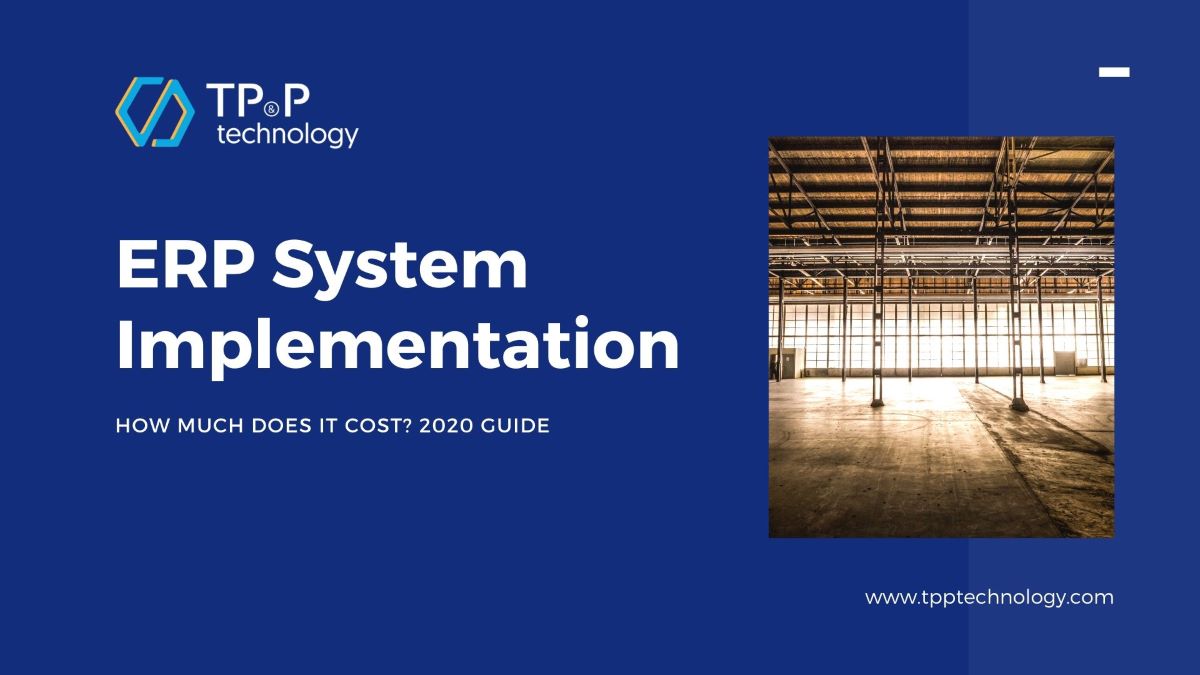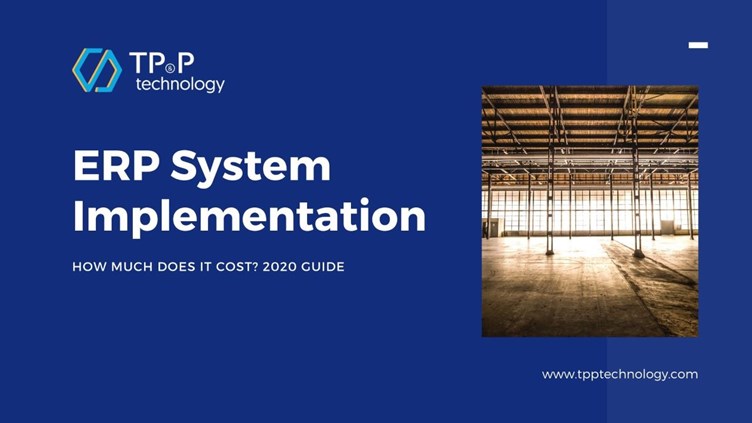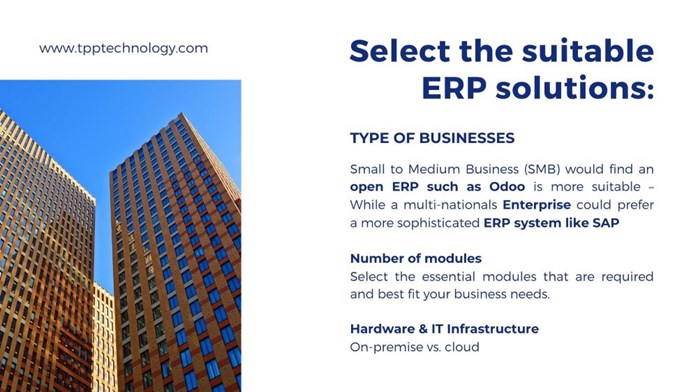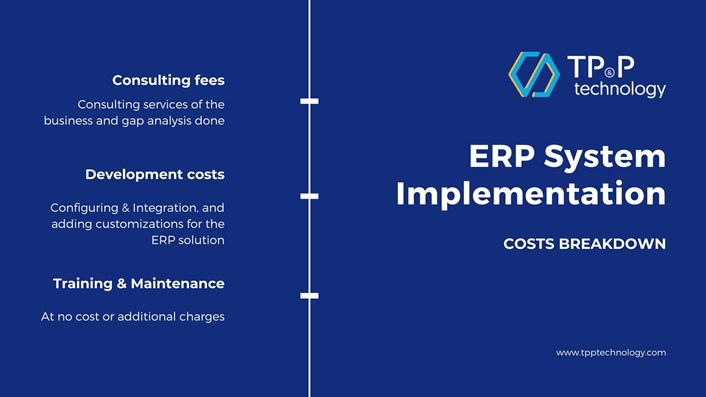
ERP System Implementation: How much does it cost?
If your business is currently evaluating to adopt an ERP solution (e.g. Odoo Manufacturing ERP, SAP) then the question about ERP Implementation cost is probably on top of your mind.
In order to arrive at an estimate for the total cost of an ERP system implementation, there’s needs to be a careful consideration of various factors which make the overall capital expenditure of investment in an ERP system vary from one company to another.
What should be understood is that, in addition to licensing costs, there are other aspects that also make up the overall cost of implementing an ERP system.
In particular, factors such as organization size, unique business requirements, and project scope all play an important role in determining the overall cost of your ERP system.
As a result, ERP implementation cost will largely depend on business sizes and the scope as well as unique requirements of your project.
ERP solutions implementation for small to medium businesses (SMB) may cost upward thousands of dollars, and to millions of dollars for large enterprises.
However, as ERP solution can provide many advantages to businesses, it should be treated as a long-term investment with long-term profit in the future.
Below is the typical breakdown of the ERP solutions implementation costs:
A - Selecting the suitable ERP solutions:

Type of businesses
There are a variety of choices when it comes to ERP solutions. For example, Small to Medium Business (SMB) would find an open ERP such as Odoo is more suitable for their companies – while a multi-nationals enterprise requiring a multi-country and multi-site set-up would probably need a more sophisticated ERP system like SAP which comes with a large set of different modules such as Financial Accounting (FI) and Plant Maintenance (PM), etc. suitable for covering numerous very complex business processes
Secondly, the number of users and functions included in the ERP solution purchased also greatly affects the price.
In general, the ERP license will be priced according to the total number of equivalent users per month/or year – therefore, large business organizations with a heavy user base are expected to pay more for the licensing cost.
Number of modules
Depends on the system of your choice, a typical ERP solution usually comes with a set of different modules for its corresponding processes.
Among the most commonly required are manufacturing, inventory, sales, accounting, finance, and more.
The power of ERP comes in the interconnected of different modules for efficient enterprise planning.
Thus, it’s important to not overlook but select only the essential modules that are required and best fit your business needs.
Some particular ERP vendor, such as SAP does offer certain ERP product which are full-license, meaning users are able to access (pending security settings) every module and feature that comes with certain SAP product.
The general rule is the more modules, or functional areas you’re going to use, the higher the cost.
Hardware & IT Infrastructure
Finally, you’re going to have to decide whether to host your ERP system on your own IT infrastructure? Or are you going with a cloud/hosted service that the ERP vendor will host for you?
Opting for an on-premises option, businesses will able to meet their required security or legal standards.
However, this will involve a large IT capital expenditure upfront. The other option is cloud hosting which usually incur annual subscription fees that is cheaper initially, but even out in the long run with the self-hosting.
B - ERP system implementation
In addition to the ERP software licensing and “hardware/cloud hosting” costs, there is also implementation costs that involve intensive input of technical and development work by the technology partner. The summarized breakdown of implementation cost is as follow:
Consulting fees
Before development, your chosen ERP implementation partner will carry out a thorough analysis to identify requirements and provide the most suitable solution according to your unique industry capacity needs.
Specifically, the ERP implementation vendor will require fees for the time and consulting services of the business and gap analysis done.
Development costs.
Next, according to the analysis and requirements done beforehand, the implementation partner will continue with the development by configuring and adding customizations for the ERP solution. Also, integrations with other 3rd party apps can also be done at this stage. Especially, the more customizations and integrations required, also subject to the level of customization complexity, the higher development costs will incur.
Training.
Once your ERP solution is successfully deployed, the targeted users may need to undergo training so that they become familiar with the system and ensure adoption. Some implementation partners may provide training at no cost as already included in the implementation fees, while some may require an additional charge for it. Besides, training also requires time by your employees which is also an additional expense for your businesses.
Maintaining your system:
Finally, after your ERP system has gone live, the extra cost of maintaining your ERP system involving the update and upgrading of your ERP system.
Conclusion:
Understanding the factors which influence the cost of ERP implementation will enable business to have an estimate of how the investment required for their ERP.
Especially, such an estimate provides an insight on whether such ERP implementation investment is above or below industry standards. Yet, the ultimate goal for many companies when adopting an ERP solution is to look for ways to optimize the costs of their ERP manufacturing solution, while having all the necessary ERP modules integrated into the system.
And to conclude, ERP system implementation is indeed a complex process which is time-intensive and costly.
It’s important to remember that ERP should be treated as a long term investment which consistently deliver reward to businesses in the long-run (through reduction in labor overheads and other benefits), ultimately making your businesses become a lot more agile and efficient.
If you are looking for an implementation partner for your ERP solution of choice, get in touch with us today.



